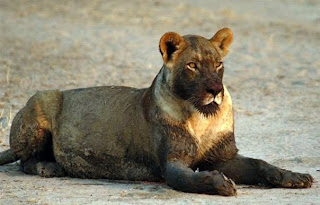



With a scarcity of food, an injured hippo is confined to barracks – left to die in the only available moisture he can find, usually the sludge of an abandoned oxbow. Sometimes death only comes days later as predators of all descriptions line up to watch the slow demise, saving their energy for the feast they know is imminent. On one occasion we watched a dying hippo in such a pool for just short of a week. Assuming the lions would move in and “finish him off”, we were surprised to find them lazily watching the scene from the shade of a small tree the following morning and even more surprised to find the geriatric had acquired a companion. This apparently healthy hippo moved into the puddle with the injured bull and during the course of the week and even after the other had died and turned the pond a mucky green, this loner appeared and disappeared.
A number of explanations are possible. Perhaps the second hippo was also a defeated bull with no where else to go and the injured bull was unable to fend him off his turf, or simply too weak to care. A controversial theory proposed in the past is that perhaps hippo, like elephants, endure some kind of kinship bond. The hippo may have been from its own pod, perhaps in a nearby stretch of river or simply recognised a species member in distress. Hippos have been known to behave quite remarkably around dead or dying creatures. Skinner reports a hippo supposedly rescuing an impala…???
The day that heralded the death of the hippo held another surprise. The first at the scene was a lonesome hyena who merely nibbled at the tough skin over the decimated rump. A couple of mouthfuls and he was gone. The next visitors (aside from warthogs, guinea fowl, puku and baboons all who drank from the fowl pond with its dead inhabitant) arrived only during the course of the following night and after a small feed by lion-standards, the male and female duo also departed leaving most of the carcass intact. They seemed to sense the virtue of allowing time to rot and forge away through the thick hide but even once this happened, the putrid carcass was relinquished to the hordes of vultures that patrol Luangwa’s skies. The dry season is vulture-prime time and the feasts are a comic to watch with birds dominating the carcass despite the ton or two of meat, tackling…falling into the mud…!!!
A number of explanations are possible. Perhaps the second hippo was also a defeated bull with no where else to go and the injured bull was unable to fend him off his turf, or simply too weak to care. A controversial theory proposed in the past is that perhaps hippo, like elephants, endure some kind of kinship bond. The hippo may have been from its own pod, perhaps in a nearby stretch of river or simply recognised a species member in distress. Hippos have been known to behave quite remarkably around dead or dying creatures. Skinner reports a hippo supposedly rescuing an impala…???
The day that heralded the death of the hippo held another surprise. The first at the scene was a lonesome hyena who merely nibbled at the tough skin over the decimated rump. A couple of mouthfuls and he was gone. The next visitors (aside from warthogs, guinea fowl, puku and baboons all who drank from the fowl pond with its dead inhabitant) arrived only during the course of the following night and after a small feed by lion-standards, the male and female duo also departed leaving most of the carcass intact. They seemed to sense the virtue of allowing time to rot and forge away through the thick hide but even once this happened, the putrid carcass was relinquished to the hordes of vultures that patrol Luangwa’s skies. The dry season is vulture-prime time and the feasts are a comic to watch with birds dominating the carcass despite the ton or two of meat, tackling…falling into the mud…!!!



No comments:
Post a Comment